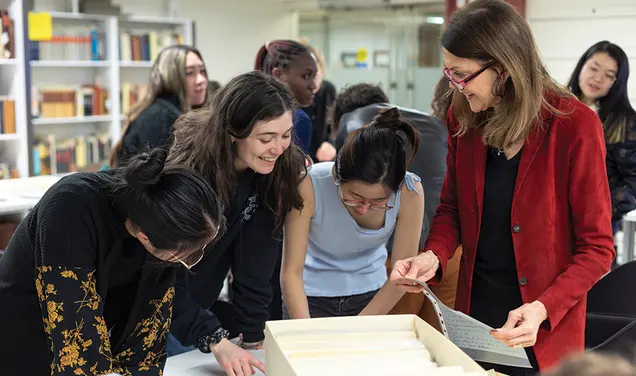Recalling Sotomayor '76 at Princeton
PAW invited two alumni who knew Sonia Sotomayor ’76 well during their years at Princeton to write about their experiences working with her and to comment on media portrayals of her since her nomination to the Supreme Court. Here are their responses.
Sergio Sotolongo ’77:
We attended the same high school, Cardinal Spellman High School, located in the Bronx. Sonia was one year ahead of me. While in high school, we participated on the debate and public speaking team as well as the student government. Sonia also was instrumental in my decision to attend Princeton, as we spoke about the relative merits of the school and I drew on her experiences as a freshman in guiding my decision to attend Princeton. While at Princeton we spoke frequently on a number of issues, including course work, professors, current political issues, etc. We were both members of the Third World Center.
Sonia is extremely focused and was very studious. She would spend a fair amount of time in Firestone. At the same time, she possesses a strong sense of herself and a pleasant disposition. Clearly, she identified herself as a Latina and was active on a number of political issues on campus. I would also describe her as a person who is a deep thinker and analyzes various parts of a problem before reacting.
There are a number of people who don’t know Sonia and would not want her named to the Supreme Court. In my estimation, she would make a terrific justice. I would offer the following reasons:
She has a stellar resume and has proved that she possess the intellectual capacity to excel.
She possesses more experience as an appellate judge than other justices in the current court.
As an appellate judge, she has had fewer decisions overturned by the Supreme Court as compared with the current court.
Clearly, her appointment would be historic, and she would serve the country well.
Joseph B. Schubert ’74:
Recent contacts have been limited, but when we overlapped at Princeton, our contact was frequent – similar circles of friends, academic interests and goals. My closest friend at Princeton was Margarita Rosa ’74, one of the first Puerto Rican women at Princeton, who also became a lawyer in New York City and remains a close friend of Sonia’s and mine.
At Princeton, Sonia was at first seemingly meek, quiet, and brainy. All of us knew early on that she was driven. Part of the drive stemmed from a need to prove that she was equal to those from privileged backgrounds. Sonia could not only “keep up,” she beat them at their own game by excelling beyond students of all backgrounds. I’ll never forget how proud we felt when we were invited back to Princeton to witness the conferring of the Pyne Prize – vindicating the hopes of all of us with similar backgrounds who knew we were just as talented and could, if given the chance, become leaders of the next generation.
Yet Sonia’s was a compassionate and sensitive ambition. I never saw her take advantage of a person or a situation to advance herself personally at the expense of the particular cause she was advocating. No one knew that she was working on the HEW complaint, for example, until it was polished to her high standards. Then she set out to convince the rest of us of its merits. Many students felt a complaint with an outside party was the wrong tactic at the wrong time. But Sonia slowly convinced other student leaders – it would be a visible and political statement, and would enable us to gain some political leverage in bargaining with the administration. The skeptics were dead wrong. Not only were there immediate results – a student-initiated seminar on Puerto Rican history and intensified efforts to recruit Latino faculty and administrators, for example – but the long-term results are still being felt today. Now it is a given that Princeton has Latino role models at all levels of faculty, administration, and student body. In addition to reflecting the country’s own diversity, Princeton has gained valuable recruiting tools and is a more hospitable place for what will soon be the nation’s largest minority group.
Sonia could easily have tried to “blend in” at Princeton as many minority students do today, but for her that was never an option. As one of the first Puerto Rican women at Princeton and Yale Law School, she never forgot her roots or her community and always turned that unique perspective into an asset. She knew she would be a role model as a “first” in many fields and that she had to be deliberative and careful in what would be a highly public life. Yet she never trumpeted her successes, even those that brought about significant change at Princeton and the larger community.
I saw her in New York two weeks ago and the years haven’t changed her – her first words were to inquire about my partner’s recent death and wishing that she could have reached out more when he died. She remains as I fondly remember her – a warm, generous-hearted and idealistic person – qualities that will be an asset to the nation as she serves on its highest court.
How that reaction compares with the ways she has been portrayed since her nomination:
I’ll briefly address three – Sonia is a radical, Sonia is outside the mainstream, and she is not “brainy” enough.
The notion of Sonia as a wild-eyed radical with an “activist” agenda is laughable. Radicals were certainly at Princeton – those who bombed ROTC and IDA, those who engaged in violent protests, those who disrupted conferences and took over buildings. She and most others were too practical to use such tactics and, frankly, knew they would produce backlash. She and others knew that the changes she sought had to be incremental and permanent, and pressure could be just as effective if it was planned, rational, and consensus-building. Thoughtful commentators who have reviewed her 17 years of judicial decisions have been unable to establish a hard-right or hard-left agenda.
Sonia is solidly within the mainstream, and particularly the American mainstream of the 21st century. The next 20 years will see a majority-minority nation, based on demographic projections. How can a nation govern itself effectively if its leaders don’t reflect its population? The right-wing fringe is using its tiresome weapon, fear, to try to hold back the tide, including using grossly exaggerated rhetoric from her speeches and pointing to her membership in civil-rights advocacy organizations. Americans, particularly Latinos, know the truth. The speeches and her memberships place her solidly in the middle of the current American populace, and, if anything, on the cautious, deliberative, and careful side of the Latino spectrum. We have too much to lose were that not the case.
Sonia isn’t brainy enough? The only record that matters on this score is her 17 years of judicial opinions. One legal colleague who went to law school in New York said that there were only two judges on the Second Circuit he studied whom he could count on to have cogent, well-reasoned opinions that were widely respected – those of Sonia and Kimba Wood.
Summa cum laude and Pyne Prize at Princeton, editor of the Yale Law Journal, appointed and confirmed twice to the federal bench by a skeptical and at times hostile Congress – if those don’t constitute intellectual gravitas in America today, and if any of these concerns prevent her confirmation, then the nation has much greater problems than ideology or race. It has problems with its soul.









No responses yet